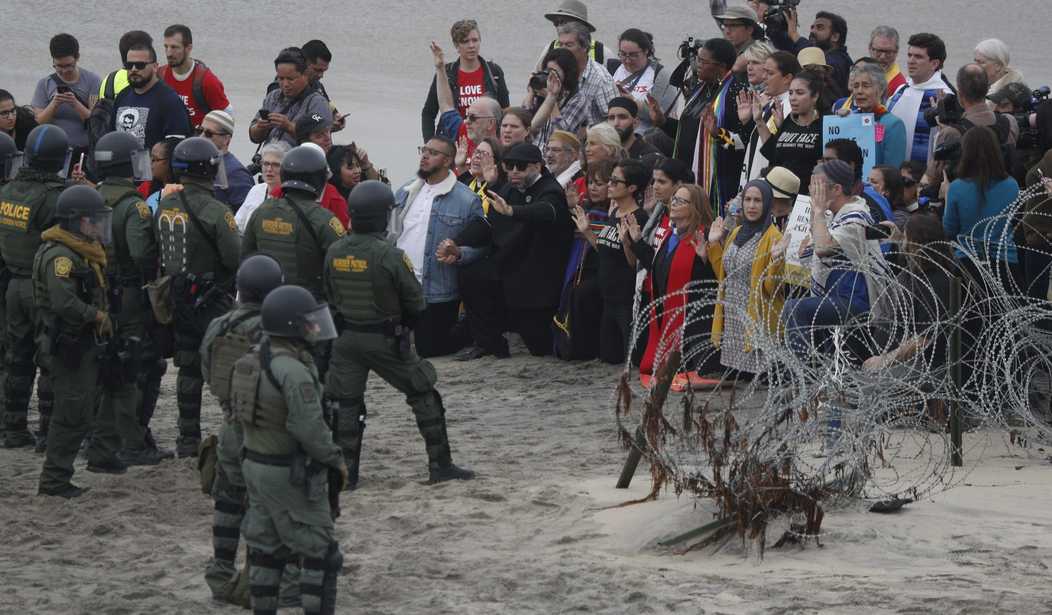Last month, 32 individuals identified as “mostly faith leaders” by the San Diego Union-Tribune demonstrated at the U.S. southern border and were arrested. A December 10 Union-Tribune article and other accounts, such as a Huffington Post report and a press release from the Council on American-Islamic Relations (CAIR), painted sympathetic portraits.
The Union-Tribune quoted Dallas imam Omar Suleiman: “We refuse to accept that this is normal. … You have a right to seek peace. You have a right to seek asylum.” The Huffington Post noted that Hussam Ayloush, the long-serving executive director of CAIR’s Los Angeles chapter, was among the first arrested. He told the reporter: “My faith in God is the most important part of my life. … And it was my faith, love and passion for dignity … that led me to protest.”
Ayloush and Suleiman frame their activism at the border as simply the behavior their faith dictates. However, statements both men made at a conference just weeks earlier suggest that potent political ideology actually motivates their efforts.
From November 22 through 24, the Muslim American Society conducted its 21st annual Los Angeles convention at the Ontario Convention Center. Ayloush and Suleiman both spoke on the 24th; Ayloush moderated a panel on Syria and Yemen at 1:30 p.m., and at 5:30 p.m. Suleiman delivered the evening’s keynote speech. Listening to their speeches there, you would be hard-pressed to understand why either of them thinks migrants should flee to a country allegedly dominated by white supremacy and blood-soaked greed.
Before beginning his sermon, Suleiman identified what he regarded as America’s most serious problem: white supremacy. He related a story of cross burnings during 2008 after President Barack Obama’s victory: “[T]hey burned those crosses on a few families’ homes’ lawns to send a message that the ideology that defines our domestic and foreign policy here in the United States, of white supremacy, is still alive and well. … That a black president could not change an essentially white supremacist system.” Suleiman continued: “As Muslims we have truly underestimated the danger of white supremacy in this country. … It’s really poisoned all of our spaces and hindered our progress as a nation.”
The Texas sheikh then transitioned to the Confederate statue controversy, accurately identifying such monuments as “idols of white supremacy,” then less accurately insisting that “even though the Confederates had lost militarily, the ideology that they espoused would continue, and it would remain the dominant ideology that would shape our policies at all levels of government.”
In Suleiman’s telling, even though it’s Abraham Lincoln on the five-dollar bill, Jefferson Davis might as well be there since he really won the Civil War. Here’s how Suleiman inflates his definition of “white supremacy”: “White supremacy is not just the loud white supremacists that’s on TV … it’s 96% of the wealthiest Americans being white, or over 80% of Congress remaining white.”
Ayloush promotes eccentric views of a different variety; he focused on alleged foreign policy evils rather than history. After the two panelists presented their cases for the depth of suffering in Yemen and Syria, Ayloush then chose to say what he claimed the panelists could not: “What has happened in Yemen and in Syria is a man-made disaster. … I know being part of relief organization, my brother Mohamed might not be able to get too much into the politics. But what is happening in Yemen is a result of sanctions, bombings from neighboring countries.”
Ayloush’s explanation for the violence? “[It]’s a huge business, you know, our own president is refusing to investigate or punish those who committed the murder of Jamal Khashoggi, because of the amount of weapons that we sell to Saudi Arabia that is mostly used against the people of Yemen.”
Such statements are par for the course for Ayloush, who generated headlines in 2015 for claiming that U.S. policies “have fueled that extremism. … We are partly responsible.”
It is accurate to recognize Ayloush and Suleiman as two of the country’s most influential Muslim leaders. However — with their extreme views that white supremacy defines America and that American greed murders children in Yemen — they are engaging in ideological activism, not an earnest expression of faith.
Follow the author on Twitter: @DaveSwindle









Join the conversation as a VIP Member